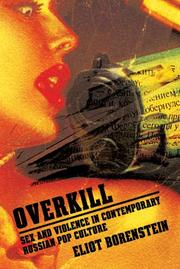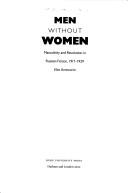| Listing 1 - 10 of 16 | << page >> |
Sort by
|

ISBN: 0801463459 9780801463457 9780801463457 0801474035 9780801474033 9780801445835 9780801474033 0801445833 Year: 2011 Publisher: Ithaca, NY
Abstract | Keywords | Export | Availability | Bookmark
 Loading...
Loading...Choose an application
- Reference Manager
- EndNote
- RefWorks (Direct export to RefWorks)
Perestroika and the end of the Soviet Union transformed every aspect of life in Russia, and as hope began to give way to pessimism, popular culture came to reflect the anxiety and despair felt by more and more Russians. Free from censorship for the first time in Russia's history, the popular culture industry (publishing, film, and television) began to disseminate works that featured increasingly explicit images and descriptions of sex and violence.In Overkill, Eliot Borenstein explores this lurid and often-disturbing cultural landscape in close, imaginative readings of such works as You're Just a Slut, My Dear! (Ty prosto shliukha, dorogaia!), a novel about sexual slavery and illegal organ harvesting; the Nympho trilogy of books featuring a Chechen-fighting sex addict; and the Mad Dog and Antikiller series of books and films recounting, respectively, the exploits of the Russian Rambo and an assassin killing in the cause of justice. Borenstein argues that the popular cultural products consumed in the post-perestroika era were more than just diversions; they allowed Russians to indulge their despair over economic woes and everyday threats. At the same time, they built a notion of nationalism or heroism that could be maintained even under the most miserable of social conditions, when consumers felt most powerless.For Borenstein, the myriad depictions of deviance in pornographic and also crime fiction, with their patently excessive and appalling details of social and moral decay, represented the popular culture industry's response to the otherwise unimaginable scale of Russia's national collapse. "The full sense of collapse," he writes, "required a panoptic view that only the media and culture industry were eager to provide, amalgamating national collapse into one master narrative that would then be readily available to most individuals as a framework for understanding their own suffering and their own fears."
Post-communism --- Popular literature --- Violence in mass media. --- Sex in mass media. --- Violence in popular culture --- Sex in popular culture --- Popular culture --- Postcommunism --- World politics --- Communism --- Literature, Popular --- Books and reading --- Mass media --- Pornography in mass media --- Sexuality in popular culture --- Social aspects --- History and criticism. --- Culture --- History and criticism
Book
ISBN: 9781501716362 9781501716355 9781501716331 9781501735776 1501716352 1501716360 1501716336 1501735772 Year: 2019 Publisher: Ithaca, NY : Cornell University Press,
Abstract | Keywords | Export | Availability | Bookmark
 Loading...
Loading...Choose an application
- Reference Manager
- EndNote
- RefWorks (Direct export to RefWorks)
In this original and timely assessment of cultural expressions of paranoia in contemporary Russia, Eliot Borenstein samples popular fiction, movies, television shows, public political pronouncements, internet discussions, blogs, and religious tracts to build a sense of the deep historical and cultural roots of konspirologiia that run through Russian life. Plots against Russia reveals through dramatic and exciting storytelling that conspiracy and melodrama are entirely equal-opportunity in modern Russia, manifesting themselves among both pro-Putin elites and his political opposition. As Borenstein shows, this paranoid fantasy until recently characterized only the marginal and the irrelevant. Now, through its embodiment in pop culture, the expressions of a conspiratorial worldview are seen everywhere. Plots against Russia is an important contribution to the fields of Russian literary and cultural studies from one of its preeminent voices.
Sociology of culture --- Political sociology --- Mass communications --- Pragmatics --- Russia --- National characteristics, Russian. --- Post-communism --- Paranoia --- Conspiracy theories --- Political culture --- Popular culture --- Social aspects --- konspirologiia. --- modern Russia. --- paranoia. --- pop culture. --- pro-Putin elites.
Book
ISBN: 9781501767821 1501767828 9781501769368 1501769367 1501767836 1501767844 Year: 2023 Publisher: Ithaca, New York : Cornell University Press,
Abstract | Keywords | Export | Availability | Bookmark
 Loading...
Loading...Choose an application
- Reference Manager
- EndNote
- RefWorks (Direct export to RefWorks)
"With the rise of new creators who emphasized their own individual voices while also focusing on their characters' inner lives, Marvel Comics in the 1970s laid the groundwork for the next decade's breakthroughs, expanding our sense of what the comics medium can do and what the superhero genre makes possible"--
Comic books, strips, etc. --- Publishers and publishing. --- History and criticism. --- History --- Marvel Comics Group --- Marvel Comics Group. --- Publishing. --- 1900-1999 --- COMICS & GRAPHIC NOVELS / Superheroes. --- Comic books, strips, etc --- LITERARY CRITICISM / Comics & Graphic Novels. --- SOCIAL SCIENCE / Popular Culture. --- 1900-1999.

ISBN: 0822325926 0822325780 0822379902 Year: 2000 Publisher: Duke University Press
Abstract | Keywords | Export | Availability | Bookmark
 Loading...
Loading...Choose an application
- Reference Manager
- EndNote
- RefWorks (Direct export to RefWorks)
Book
ISBN: 9781350113565 9781350113541 9781350113558 9781350113534 1350113557 1350113573 1350113565 Year: 2022 Publisher: London Bloomsbury Academic
Abstract | Keywords | Export | Availability | Bookmark
 Loading...
Loading...Choose an application
- Reference Manager
- EndNote
- RefWorks (Direct export to RefWorks)
"After their scandalous performance of an anti-Putin protest song in Moscow's Cathedral of Christ the Savior and the imprisonment of two of its members, the punk feminist art collective known as Pussy Riot became an international phenomenon. But, what, exactly, is Pussy Riot, and what are they trying to achieve? The award-winning author Eliot Borenstein explores the movement's explosive history and takes you beyond the hype"--
Community organization --- Russia --- Protest movements --- History --- Pussy Riot (Musical group)
Book
ISBN: 1501716336 1501716360 Year: 2019 Publisher: Ithaca, NY : Cornell University Press,
Abstract | Keywords | Export | Availability | Bookmark
 Loading...
Loading...Choose an application
- Reference Manager
- EndNote
- RefWorks (Direct export to RefWorks)
In this original and timely assessment of cultural expressions of paranoia in contemporary Russia, Eliot Borenstein samples popular fiction, movies, television shows, public political pronouncements, internet discussions, blogs, and religious tracts to build a sense of the deep historical and cultural roots of konspirologiia that run through Russian life. Plots against Russia reveals through dramatic and exciting storytelling that conspiracy and melodrama are entirely equal-opportunity in modern Russia, manifesting themselves among both pro-Putin elites and his political opposition. As Borenstein shows, this paranoid fantasy until recently characterized only the marginal and the irrelevant. Now, through its embodiment in pop culture, the expressions of a conspiratorial worldview are seen everywhere. Plots against Russia is an important contribution to the fields of Russian literary and cultural studies from one of its preeminent voices.
National characteristics, Russian. --- Post-communism --- Paranoia --- Conspiracy theories --- Political culture --- Popular culture --- Social aspects --- Social aspects --- konspirologiia. --- modern Russia. --- paranoia. --- pop culture. --- pro-Putin elites.
Book
ISBN: 1350181560 1350181552 1350181544 Year: 2022 Publisher: London [England] : London [England] : Bloomsbury Academic, Bloomsbury Publishing,
Abstract | Keywords | Export | Availability | Bookmark
 Loading...
Loading...Choose an application
- Reference Manager
- EndNote
- RefWorks (Direct export to RefWorks)
"The Russian internet is a hotbed for memes and viral videos: the political, satirical and simply absurd compete for attention in Russia while the West turns to it for an endless reserve of humorous content. But how did this powerful cyber community grow out of the repressive media environment of the Soviet Union? What does this viral content reveal about the country, its politics and its culture? And why are the memes and videos of today's Russia so popular, spreading so rapidly across the globe? Award-winning author Eliot Borenstein explores the explosive online movement and unpicks, for the first time, the role of mimetic content and digital activism in modern Russian history up to the present day"
Memes --- Digital media --- Internet and activism --- Political aspects
Multi
ISBN: 9781501716362 Year: 2019 Publisher: Ithaca, N.Y. Cornell University Press
Abstract | Keywords | Export | Availability | Bookmark
 Loading...
Loading...Choose an application
- Reference Manager
- EndNote
- RefWorks (Direct export to RefWorks)
Book
ISBN: 9781501769870 Year: 2023 Publisher: Ithaca, New York : Cornell University Press
Abstract | Keywords | Export | Availability | Bookmark
 Loading...
Loading...Choose an application
- Reference Manager
- EndNote
- RefWorks (Direct export to RefWorks)
As Borenstein shows in his readings of a range of popular culture texts, the imaginary identities Russians have been trying on since the Soviet collapse reflect an aggressive, often outward-facing self-hatred that allows some Russians to come to terms with their country's standing in the world, the social and economic misery, and the dominance of oligarchism and Putinsim
Book
ISBN: 9781501767845 Year: 2023 Publisher: Ithaca : Baltimore, Md. : Cornell University Press, Project MUSE,
Abstract | Keywords | Export | Availability | Bookmark
 Loading...
Loading...Choose an application
- Reference Manager
- EndNote
- RefWorks (Direct export to RefWorks)
"With the rise of new creators who emphasized their own individual voices while also focusing on their characters' inner lives, Marvel Comics in the 1970s laid the groundwork for the next decade's breakthroughs, expanding our sense of what the comics medium can do and what the superhero genre makes possible"--
Publishers and publishing. --- Comic books, strips, etc. --- History --- History and criticism. --- Marvel Comics Group. --- Marvel Comics Group --- Publishing.
| Listing 1 - 10 of 16 | << page >> |
Sort by
|

 Search
Search Feedback
Feedback About UniCat
About UniCat  Help
Help News
News